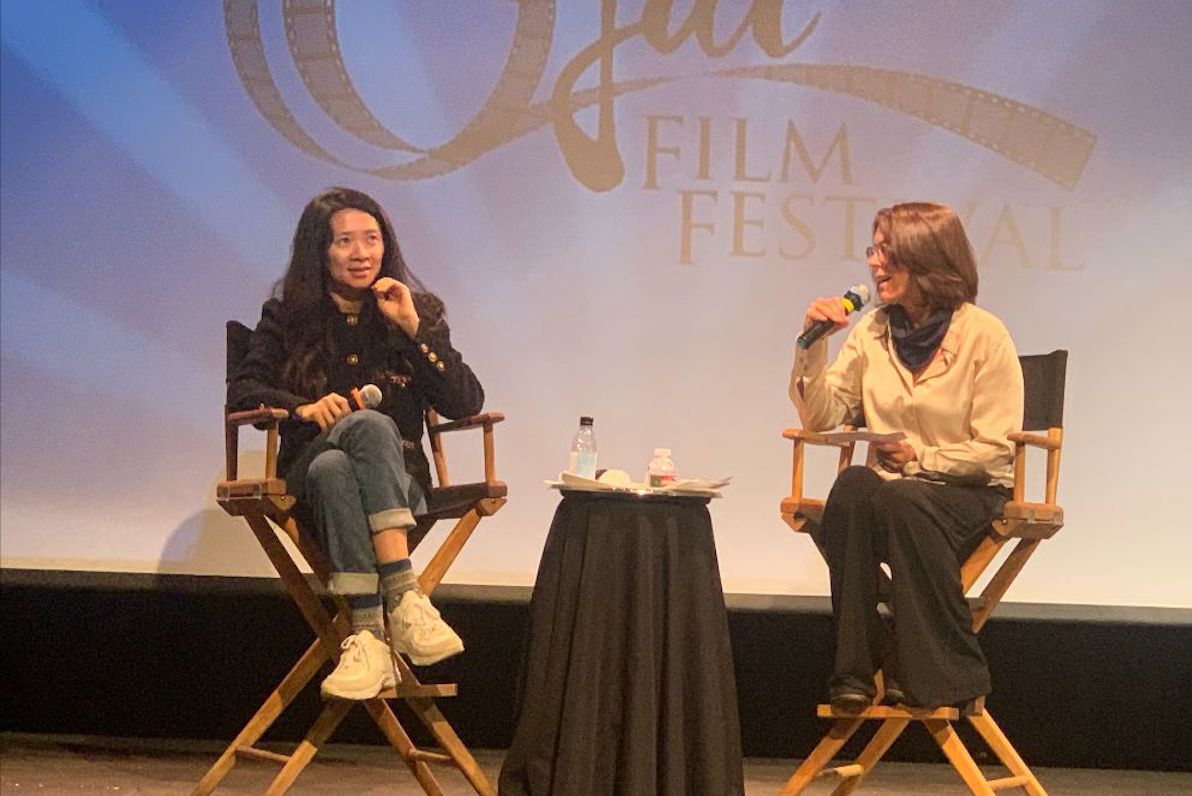Pano: Chloé Zhao for the Win in Ojai
Ojai Film Fest Welcomes Chloé Zhao For Screening And Conversation

This holiday season, we’re bringing you the best in our newsletters from 2021. Sign up for content like this and more here.
The 22nd Ojai Film Festival, which began on November 4, concluded with Chloé Zhao’s 2017 film The Rider at the Ojai Arts Center on Saturday, November 13. As every film-conscious person on the planet now knows, Zhao directed Nomadland, which took home three of the most coveted Academy Awards in 2021 — Best Picture, Best Director, and Best Actress for Frances McDormand. The Rider is her second feature film and the one that brought her to the attention of the folks responsible for hiring her to direct Eternals, the latest installment of the Marvel Universe that’s in theaters right now.
As a favor to Ojai, which has been her home since December 2017, Zhao came out for the screening and stayed for a fascinating and substantial Q and A session hosted by Laura Ward, the Ojai Valley News publisher. Thanks to the Santa Barbara International Film Festival, we are spoiled with opportunities of this sort here in Santa Barbara, yet even in that context, this particular conversation stood out. Zhao is thoughtful and well-spoken in the extreme. Especially after seeing The Rider, an exquisite film full of radiance and subtlety, one was left with the impression that film history was being made. Perhaps this is what it was like for those who caught up with Orson Welles in 1942 when he was fresh off directing and starring in Citizen Kane. In any event, it was a treat. What follows is based on notes taken during the talkback.
Zhao opened the discussion by saying that she admires filmmakers with a strong sense of their identity, which she claims she does not have.
In response to a question about how she wrote The Rider, which features a cast almost entirely made up of first-time actors, Zhao said that she does not have a theater background, which means that she approaches making a film very differently. She only rehearsed her actors for a total of 10 hours before she started to shoot the movie, and she said that her technique involves casting, writing, and editing as she goes. She cited her tendency to shoot “unconventional coverage” as one way her style diverges from the norm.
This answer led to another observation about how she directs. After working with non-actors in her first two films, she found the transition to coaching professionals challenging. They required more attention from her, and it was something she had to learn to give. She said that non-actors tend not to overthink their roles because they aren’t thinking about having a career.
This edition of Pano was originally emailed to subscribers on November 17, 2021. To receive Charles Donelan’s arts newsletter in your inbox, sign up at independent.com/newsletters.
One of the most exciting answers she gave came in response to a question about what attracted her to Brady, the central character in The Rider, and why she felt there was a movie in his story. Zhao said that she was watching Brady, a rodeo rider and horse trainer, work with an animal one day, and she asked him what a particular bone in the horse’s back was for. Brady told her that “God put that bone there so that the horse could hold a saddle.” “I responded to his conviction at that moment,” Zhao said, explaining that hearing how fully he believed in what he was saying made her feel there was a story to be told about his worldview.
In response to a question about the Western genre, Zhao said that she was not an expert in that area. She then went on to explain how she arrived at the plot of The Rider. Coming from a Chinese family steeped in the Taoist tradition, she was brought up to respect the leading principle in Taoism, which is inaction — the harmony achieved by not doing. Her films tend to present heroes who don’t do what they set out to do. With Brady, the one thing she knew about the ending as she was making the film was that he would not ride in another rodeo.
This answer led to a further discussion of how the film ends, followed by Zhao’s disclaimer that of all the things she learned from making The Rider, the most important was never to try to make a feature film with only five people on the crew again.
The evening’s most poignant moment came when Zhao described her decision to move to Ojai. She had been living in Colorado and knew she wanted to find a quiet place convenient to Los Angeles. She and her partner, the cinematographer Joshua James Richards, were driving through Ojai on December 4, 2017, looking for a rental property, when they saw a strange light over the hills. This glow was not the magic light for which Ojai is famous. Instead, it was the first flames of what would become the Thomas Fire. They escaped through the traffic on Highway 33, along with many other frightened people, but they came back just five days later. The sense of community they observed during the aftermath of the Thomas Fire confirmed their decision to make Ojai their new home.
The conversation continued into the night, as Zhao demonstrated extraordinary patience and generosity with all the different constituencies that had turned out to hear her speak. She made time for the Ojai neighbors, the Marvel fanboys, and the aspiring filmmakers. It will be a pleasure to follow her exciting career, knowing how warmly she responds to the attention she so thoroughly deserves.
Support the Santa Barbara Independent through a long-term or a single contribution.



